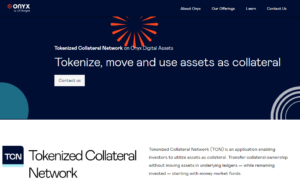JPMorgan stands as a major player among US banks. Recently, they harbored doubts about the decentralized sector. Nevertheless, they seem to be gradually shifting their perspective. They have now introduced a new Tokenized Collateral Network (TCN).
Let’s explore the initial steps JPMorgan has taken into the realm of digital asset platforms. While it isn’t fully decentralized, it’s certainly a step in the right direction.
JPMorgan Launches Tokenization Platform – First Trade Settled With BlackRock.
“Bitcoin itself is a hyped up fraud.”
~ Jamie Dimon, CEO JP Morgan pic.twitter.com/YmAmK0np0r
— Jason A. Williams (@GoingParabolic) October 11, 2023
What Is the Tokenized Collateral Network (TCN)?
The Tokenized Collateral Network (TCN) leverages blockchain technology and has been developed in-house by JPMorgan. Initial internal testing dates back to May 2022, and some sources suggest it may have launched as early as 2021. However, there is no reference to this platform on their X account.
On October 11th, Bloomberg reported on the first settlement conducted with BlackRock, another financial powerhouse in the US, also one of their key clients. BlackRock tokenized “shares in one of its money market funds.” Subsequently, BlackRock transferred these tokenized assets to Barclays bank, utilizing them as collateral for a trade. Both banks engaged in an OTC (over-the-counter) derivatives trade, which occurs directly between two parties without a public exchange as an intermediary.
Tokenization is an emerging niche in the cryptocurrency sector, poised for significant growth. According to this report, the market could reach a valuation of $16 trillion by 2023. This is one of the driving forces behind JPMorgan’s entry into this arena. However, as previously noted, their TCN platform remains centralized. Major banking institutions like JPMorgan tend to prefer this model due to their control concerns; decentralization could jeopardize their oversight.
This is exciting: JPM did its 1st live blockchain-based collateral transaction with other entities, using its Onyx blockchain to tokenize shares in a BlackRock money market fund and transfer them to Barclays via its Tokenized Collateral Network. BUT…  https://t.co/uWlZkcOMv9
https://t.co/uWlZkcOMv9
— Noelle Acheson (@NoelleInMadrid) October 11, 2023
Why Does JPMorgan Want to Tokenize Assets?
Tokenizing assets simplifies and accelerates transactions. It allows capital to be unlocked, tokenized, and utilized as collateral—even during ongoing sales. This illustrates its efficiency.
Through TCN, JPMorgan can create, transfer, and settle these tokenized assets. Traditionally moving assets is often slow, but digitizing them allows for instant movement. This change could render traditional unsecured and costly credit lines redundant, while also enabling tokenized collateral to be used in secured repo transactions—short-term agreements where securities are sold with the plan to repurchase them later at a slightly higher price.
Thus, TCN serves as JPMorgan’s distributed ledger system. Although external clients can utilize it, they must run their own node to settle trades on the digital ledger with JPMorgan. Blockchain technology minimizes the risk of errors and fraud, offering institutions a broader selection of collateral. The diversification of collateral types supports greater flexibility for these institutions.
As illustrated, TCN is a financial product aimed at institutions. Nonetheless, JPMorgan is not neglecting retail customers and small businesses. They are also developing a CBDC-style digital currency, designed as a hybrid between stablecoins and CBDCs. Like TCN, it will utilize blockchain technology but will not be decentralized.

Conclusion
It is evident that a major US bank like JPMorgan is beginning to embrace blockchain technology. They are entering the tokenization of assets (RWA), all within their own centralized version of Distributed Ledger Technology (DLT).
This strategy enables them to maintain control. The tokenized asset market is projected to reach a volume of $16 trillion by 2023, and JPMorgan is keen not to miss this opportunity. It seems they appreciate the technological aspects of crypto but remain cautious regarding cryptocurrency itself—at least for now.
Disclaimer
The insights provided by Altcoin Buzz do not constitute financial advice. They are intended solely for educational, entertainment, and informational purposes. Any strategies or information are based on the author’s views and risk preferences, which may differ from your own.
We accept no responsibility for any losses incurred from investments directly or indirectly linked to the information shared. Investing in Bitcoin and other cryptocurrencies is high-risk; therefore, conducting thorough research is essential.
Copyright Altcoin Buzz Pte Ltd.
The post Why JPMorgan Launches Platform to Tokenize Financial Assets? appeared first on Altcoin Buzz.








